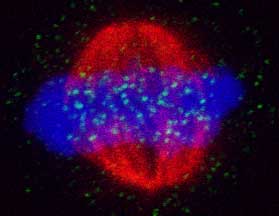
Approximately 25% of all human cancers carry KRAS gene mutations. These include most pancreatic cancers, as well as many cancers of the lung and colon. It has recently been suggested that drugs that interfere with cell division (anti-mitotic drugs) selectively kill KRAS-mutant cancer cells. This idea is being tested in clinical trials.
Researchers at the Medical Research Council (MRC) Cancer Unit (Dr David Perera and Prof Ashok Venkitaraman) have found that mutations in KRAS alone do not predict whether cancer cells will respond to anti-mitotic drugs. Instead, contrary to expectations, high expression of a second cancer-causing gene, c-MYC, cooperates with KRAS mutations to determine responsiveness. The study, entitled ‘Oncogenic KRAS triggers MAPK-dependent errors in mitosis and MYC-dependent sensitivity to anti-mitotic agents’ was recently published in Scientific Reports.
The authors used a cell line in which KRAS expression was synthetically induced to examine mitotic progression and chromosome behaviour shortly following KRAS overexpression. They noted a range of mitotic defects in these cells including errors in chromosome alignment and segregation. They observed similar effects in a number of other KRAS-mutant cell lines, an effect that was attributed to hyper-activation of the MAPK signalling pathway.
The mitotic delay in these KRAS activated cells was shown to enhance sensitivity to chemotherapeutic treatments that inhibit normal mitotic progression (e.g. paclitaxel). This was associated with a higher incidence of cell death and decreased colony forming activity. Further investigation revealed that KRAS activation increases sensitivity to anti-mitotic agents through two distinct mechanisms; by lowering the threshold for cell death induction and by delaying mitotic progression, thus allowing for death signals to accumulate. Examination of the mechanism underlying these effects demonstrated that they were mediated through c-MYC-mediated down-regulation of the anti-apoptotic protein BCL-XL.
These findings led the authors to further investigate the possibility that anti-mitotic chemotherapies could be used to collectively target tumours with KRAS mutations. They assessed this theory using cultured cell lines (both wild-type and mutant for KRAS) and by surveying various databases of anti-cancer drug responses. While they found that KRAS mutations do not automatically confer sensitivity to anti-mitotic treatments, a possible cooperative effect of KRAS mutation and high c-MYC expression in determining anti-mitotic drug response was observed.
Dr David Perera, first author on this study, commented:"Our findings caution against the use of KRAS mutation alone as a biomarker predictive of response to anti-mitotic drugs such as paclitaxel, a drug which is currently used in the clinic for the treatment of several types of cancer. However, we suggest that high expression of a second cancer-causing gene, c-MYC, may cooperate with KRAS mutations to determine responsiveness.”
This study suggests that drugs targeting the cooperation between c-MYC and mutant KRAS could provide new approaches to treat pancreatic, lung or colon cancers. “Our study opens up new avenues to therapeutically target KRAS-mutant tumours and to stratify patients in ongoing clinical trials of anti-mitotic drugs.”
This work was supported by the UK Medical Research Council.
Reference Perera D and Venkitaraman AR. Oncogenic KRAS triggers MAPK-dependent errors in mitosis and MYC-dependent sensitivity to anti-mitotic agents. Sci Rep (2016). DOI: 10.1038/srep29741















